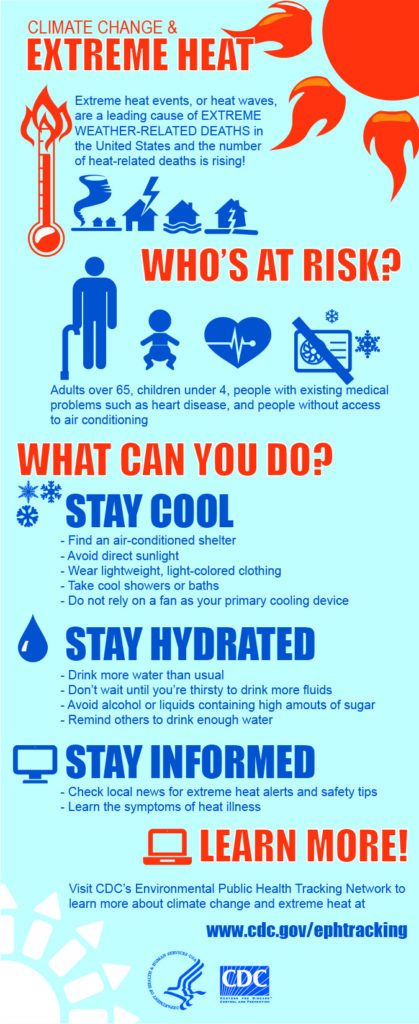Stay safe during summer heat!

Be sure to follow these summer safety tips during the heat:
- Drink plenty of fluids. You will need to drink more fluids than your thirst level indicates. Avoid drinking alcoholic beverages or drinks with large amounts of sugar because they cause you to lose more fluid.
- Wear sunscreen and appropriate clothing. Sunscreen should be SPF 15 or greater and applied 30 minutes before going outdoors. Choose lightweight, light-colored, loose-fitting clothing. Wear a wide-brimmed hat that will provide shade and keep your head cool.
- Schedule outdoor activities carefully. If you must be outside, try to plan your activities so that you are outdoors either before noon or in the evening.
- Stay indoors and, if at all possible, stay in an air-conditioned place. If your home does not have air conditioning, go to the shopping mall or public library. Even a few hours spent in air conditioning can help your body stay cooler when you go back into the heat.
- Never leave anyone in a closed, parked vehicle.
- Use a buddy system. When working in the heat, monitor the condition of your co-workers and have someone do the same for you.
- Monitor those at high risk, including infants and children up to 4 years of age, people 65 and older, people who are overweight, people who overexert during work or exercise and people who are ill or on certain medications for blood pressure diuretics. Visit adults at risk at least twice a day and closely watch them for signs of heat exhaustion or heat stroke. Infants and young children need much more frequent watching.
Signs of heat-related illnesses include an extremely high body temperature (above 103°F); red, hot and dry skin (no sweating); rapid, strong pulse; throbbing headache; dizziness; nausea; confusion; muscle cramps; tiredness and unconsciousness. If someone starts to experience these symptoms, seek medical help immediately and move them to a shady spot, if outdoors, and begin cooling them using whatever methods are available. Monitor body temperature, and continue cooling efforts until the body temperature drops to 101-102°F.




Republished from Lexington-Fayette Health Department.
https://www.lfchd.org/heat-safety/